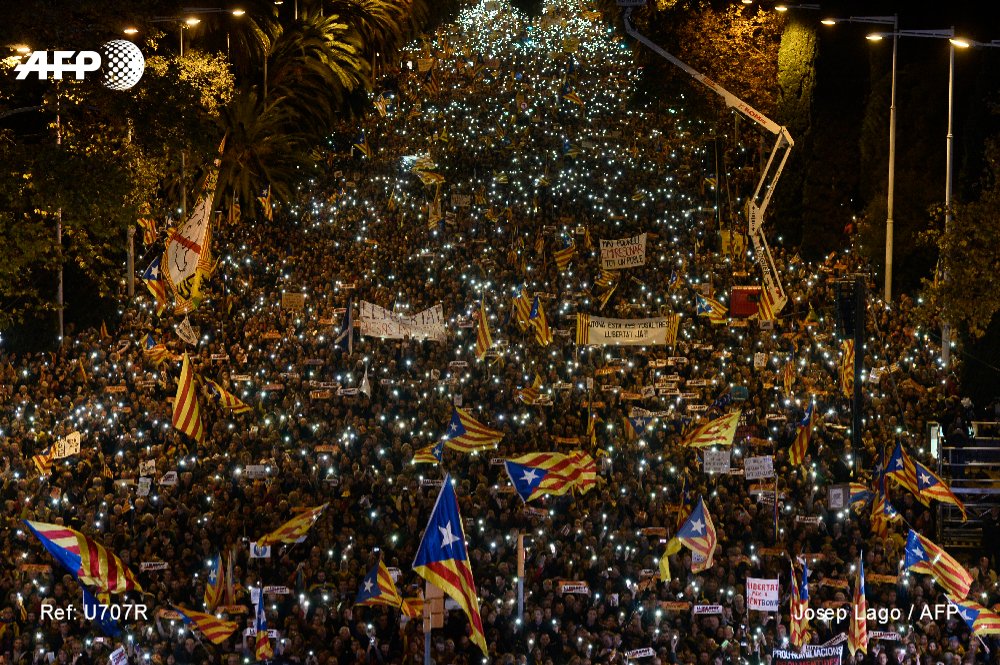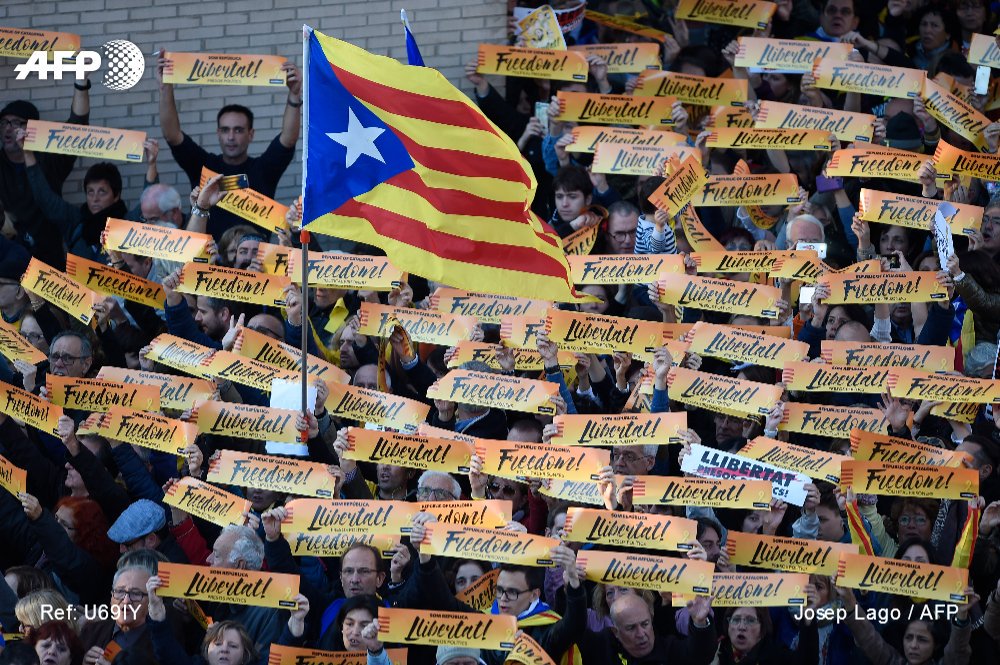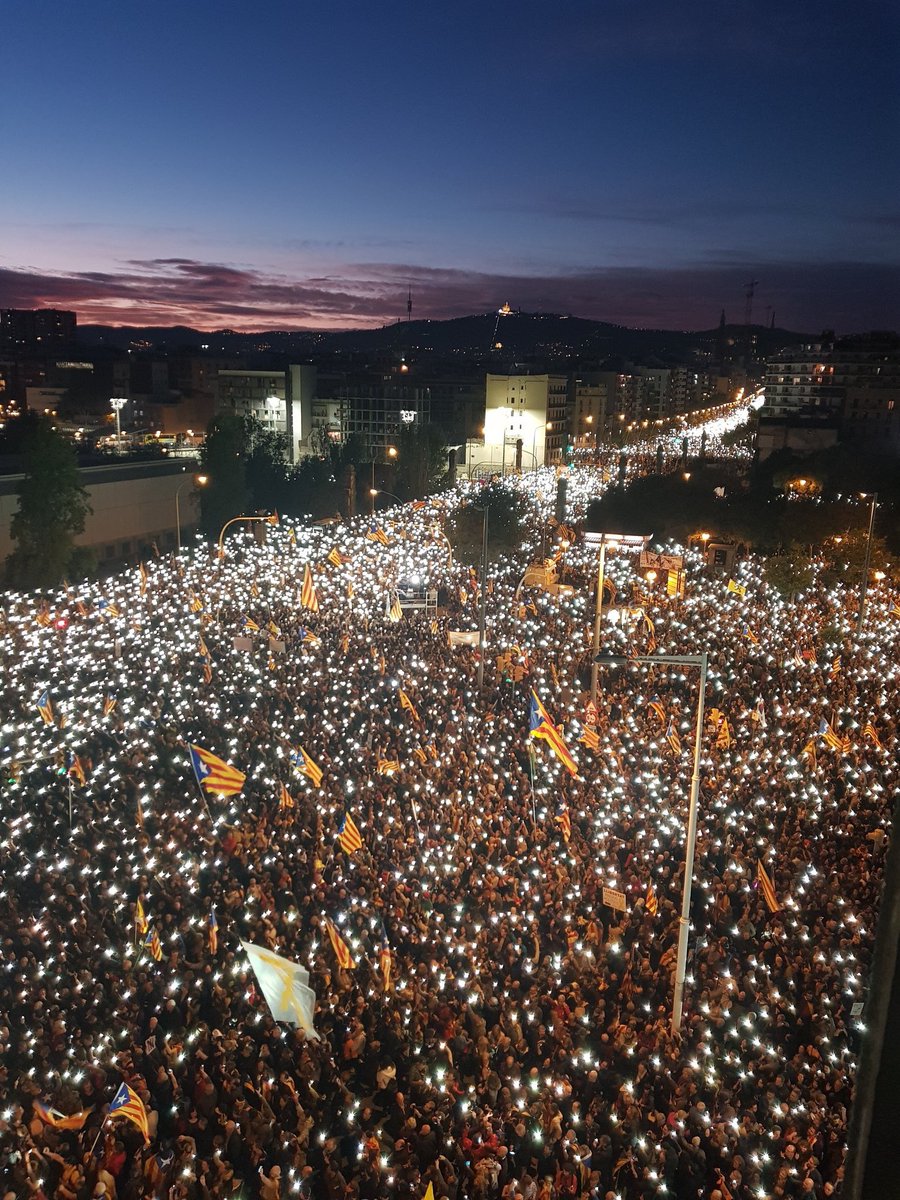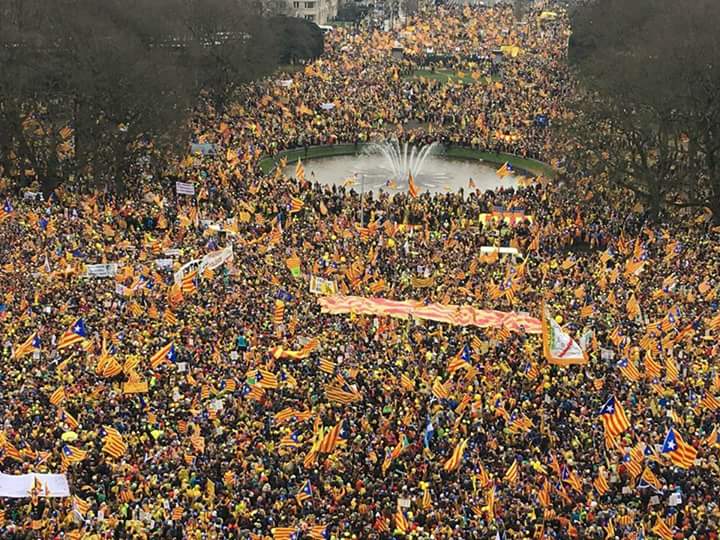Kataloniji u čast - mogući referendoom

- Posts : 10317
Join date : 2012-02-10
- Post n°376
 Re: Kataloniji u čast - mogući referendoom
Re: Kataloniji u čast - mogući referendoom
Catalan separatists to contest election separately

- Guest
- Post n°378
 Re: Kataloniji u čast - mogući referendoom
Re: Kataloniji u čast - mogući referendoom
The president of the European Commission, Jean-Claude Juncker, on Thursday demanded that Europe reject nationalism. "Nationalisms are a poison that prevent Europe from working together," he said in a speech delivered at the university of Salamanca in Spain. He also spoke out against "any form of separatism", which he says could weaken Europe and expand existing fissures.
šokovi

- Posts : 41717
Join date : 2012-02-12
Location : wife privilege
- Post n°379
 Re: Kataloniji u čast - mogući referendoom
Re: Kataloniji u čast - mogući referendoom
Приштини се то неће свидети.
_____
the more you drink, the W.C.
И кажем себи у сну, еј бре коњу па ти ни немаш озвучење, имаш оне две кутијице око монитора, видећеш кад се пробудиш...

- Guest
- Post n°382
 Re: Kataloniji u čast - mogući referendoom
Re: Kataloniji u čast - mogući referendoom
A tale of changing destinies: Why the Catalans are pushing for independence rather than the Basques
While all eyes are currently on Catalonia, it was the Basque Country that first sought a degree of sovereignty from Spain over a decade ago, when then Basque President, Juan José Ibarretxe, proposed redefining the Basque relationship with Spain as one of ‘free association’. But why did Madrid’s refusal of Ibarretxe’s proposals result in a return to moderation, whereas deposed Catalan President Carles Puigdemont and his allies decided to defy Madrid and proceed with their plans? Caroline Gray explains the different responses.
Traditionally, it is the Basques who have shown more inclination to seek sovereignty and fundamental constitutional change than the Catalans. The mainstream Catalan nationalist party did not explicitly shift towards a pro-sovereignty agenda until 2012, following tentative developments in this direction from around 2008. Why is it, then, that a strong independence movement has ended up developing in Catalonia rather than the Basque Country?
For decades, the Catalan nationalists’ behaviour suggested they felt able to realise their ambitions via accommodationist tactics. This involved making gradual decentralisation gains within existing legal and political frameworks and by working with Spanish political actors. Not only that, but they clearly wanted Catalonia to play a leading role in Spain, in contrast to the Basque nationalists, who were not interested in engaging with wider Spain beyond the bare necessities.
Not surprisingly, it was the Basque nationalists who first devised a pro-sovereignty agenda. This took the form of the ‘Ibarretxe Plan’, thus named after the Basque regional president at the time, Juan José Ibarretxe, which was first presented in 2003. The Plan proposed a revised autonomy statute which would have redefined the Basque relationship with Spain as one of ‘free association’ and opened the door to a self-determination referendum.
The proposal was essentially for a confederal solution rather than full independence, but it would have left the Basque Country with a much looser connection to Spain, going well beyond its already extensive fiscal and policy competences to reconceptualise the region as a nation on an equal footing to the Spanish one and to establish a bilateral relationship of equals sharing sovereignty between them. Importantly, under this proposal, the Basques would also have had their own representation in the EU.
The Plan, having been approved (albeit only just) in the Basque parliament in 2004, was then resoundingly rejected by the Spanish parliament as unconstitutional, for the same reasons that Madrid has consistently rejected Catalan attempts to hold a referendum. Under the Spanish Constitution, Spain is one indissoluble nation and sovereignty lies with all the Spanish people, making self-determination in one part of the territory impossible.
Ibarretxe then tried a different tack, proposing the holding of an official vote in the Basque region to ask citizens whether Basque parties should initiate negotiations to reach an agreement on exercising the ‘right to decide’ of the Basque people – subject to ETA definitively renouncing violence beforehand. The Basque parliament approved a Consultation Law to this effect in 2008, but once again it was rejected, this time by the Constitutional Court.
Basque and Catalan responses
While Madrid’s response to Basque and Catalan attempts to seek sovereignty has been one of defiant rejection in both cases, it is interesting that Basque and Catalan nationalist political agendas have evolved in different ways in consequence. In the Basque Country, politicians kept within the parameters of Spanish law at all times and the failure of Ibarretxe’s proposals eventually resulted in a return to a more moderate agenda under current Basque regional president Iñigo Urkullu, Ibarretxe’s successor at the helm of the Basque Nationalist Party. In contrast, deposed Catalan president Carles Puigdemont and his team decided to defy Madrid, hold an illegal referendum and proclaim independence anyway, for which they now face legal action.
What explains these differences? Several contributing factors can be identified, including: 1) much higher civil society mobilisation in Catalonia than in the Basque Country; 2) the history of terrorism in the Basque Country but not in Catalonia; 3) the different levels of fiscal devolution in the two regions; and 4) the different political relationships and alliances that the traditional Basque and Catalan nationalist parties have had with other parties in their regions.
Different levels of mobilisation
First and foremost, the existence of highly mobilised pro-independence civil society groups in Catalonia, but not in the Basque Country, explains a lot. When Ibarretxe returned from Madrid following the Spanish parliament’s defiant ‘no’, he called early elections in April 2005 expecting a strong victory. Instead, the Basque Nationalist Party (PNV) suffered electoral decline, winning again, but with fewer seats than before.
By then, there was widespread feeling even within the PNV itself that the timing had not been right and the plan had been too divisive, for it was pushed through parliament with a narrow majority consisting of the PNV’s votes and those of three politicians from the radical secessionist party Batasuna, which had still not managed to sever links with Basque terrorist group ETA. In 2009, the PNV then lost power in the Basque region for the first (and so far only) time despite winning the most seats, since a highly unusual coalition between the conservatives and the socialists forced it into opposition, upon which Ibarretxe retired from political life.
PNV politicians I have interviewed are the first to admit that they feel Ibarretxe’s attempts were too heavily party-led without sufficient backing from society, a mistake for which the party ultimately suffered. Nowadays, they are reluctant to take any similar projects forward without the backing of not only the Basque radical secessionist left (grouped together under the coalition EH Bildu) but also the Basque Socialists, a federation of the Spanish Socialist party. They wish to secure cross-party support which spans the nationalist-statewide divide, as well as sufficiently clear support from society, neither of which are currently forthcoming.
This is in stark contrast to the situation in Catalonia. There, despite the parliamentary majority held by the pro-independence forces being equally fragile, pro-independence civil society groups – particularly the Catalan National Assembly and Òmnium Cultural – have been very heavily mobilised and have at times ended up appearing to force the hand of politicians.
Catalan society is divided and polls have usually shown in recent years that, despite the rise in pro-independence sentiment, those against independence remain in the majority (though Madrid’s recent heavy-handedness could yet tip the balance). This notwithstanding, given the extent of citizen mobilisation, the mainstream Catalan nationalist party, then led by Artur Mas, felt it had little option but to ride the wave and turn in favour of self-determination and then independence, after Madrid had once again refused devolving further fiscal powers to the region back in 2012. Otherwise, it risked becoming irrelevant.
Different histories
So why are the Catalans so mobilised but not the Basques? The different histories of the two regions are undoubtedly a contributing factor. For many Basques, the history of terrorist violence is all too recent – ETA only finally declared a permanent ceasefire in 2011 – and they are simply not interested in risking reigniting divisions.
Moreover, a lot of Basques are simply quite comfortable with the status quo and realise they’ve got a pretty good deal in Spain. Like everywhere, the Basque region has suffered in the aftermath of the financial crisis, but in comparative terms, it has fared better than most other Spanish regions. This is in part because construction was not a major sector in the Basque region, so it was not hit by the property crash that badly afflicted Spain elsewhere. Even more importantly, the system of fiscal autonomy in the region – named the Basque Economic Agreement – affords it far more resources per capita than what comparably wealthy regions (like Catalonia) get under the common financing system, due in part to the heavily redistributive nature of the latter system.
Securing a new status for the Basque Country has therefore not been an immediate priority in recent years for many within Basque society, nor indeed for many within the PNV itself. The Basque government has been concerned first and foremost with addressing the consequences of the financial crisis, for this is their responsibility and theirs alone. The fiscal autonomy model puts the onus on the Basque authorities to collect taxes, which means they cannot look to the Spanish government for additional financing or blame it for the region’s financial woes – in contrast to what has happened in Catalonia.
Different political alliances
Last but not least, the question of different political alliances in the Basque and Catalan regions also explains a lot. In Catalonia, the centre-right Democratic Convergence of Catalonia (CDC/Convergència) party – now rebranded as the Catalan European Democratic Party (PDeCAT) – and the Republican Left of Catalonia (ERC) reached a decision prior to the 2015 Catalan elections to subordinate their differences over left-right politics to their common position on territorial politics. Thus they combined forces on a joint platform and a single electoral list (Junts pel Sí – “Together for Yes”) to seek independence for Catalonia at the regional elections on 27 September 2015, following which they would also rely on support from the anti-capitalist CUP party to give the pro-independence parties a majority in the Catalan parliament.
Despite the somewhat tenuous unity between parties of radically different left-right orientation, an alliance of sorts has been possible, though it has resulted in Convergència, the once leading nationalist party, being overtaken in popularity by parties of left-wing inclination. Recent polls show very clearly that ERC would now win more votes if the parties ran separately.
This is the Basque Nationalist Party’s idea of an absolute nightmare. It has looked on in horror as the once moderate centre-right nationalist party Convergència has been overtaken in popularity by left-wing pro-independence alternatives, and it has no desire to risk the same fate in the Basque Country. The PNV did briefly flirt with an alliance with left-wing secessionist forces back in the late 1990s when it signed the Lizarra Pact with them, but this was short-lived (since ETA broke its ceasefire on which the Pact depended), and the PNV has shown little inclination to become close bedfellows again with the radical secessionist left ever since. Far from seeking collaboration, the two forces are in competition with one another to lead the process of securing a new relationship for the Basque Country with Spain.
There is also another important reason why Convergència has ended up in a close alliance with pro-independence parties while the PNV has not. Convergència traditionally allied with the right-wing, centralist People’s Party (PP) – which governs Spain – in Catalonia when it had a minority of seats and needed some extra support, as well as supporting the PP in Madrid. Such relationships ultimately proved too cosy for Catalan voters’ liking, pushing many to switch to left-wing pro-independence alternatives, and making it untenable for Convergència to continue allying with the Spanish right. In contrast, the PNV’s preferred ally in the Basque parliament (be it through formal coalitions or more informal parliamentary support arrangements) has almost always been, and continues to be, the Basque Socialist party – a much more palatable option to PNV voters.
Sights still set on sovereignty
Under Iñigo Urkullu, the PNV thus appears to have returned to a path of moderation, and the once similar Basque and Catalan nationalist parties are now following fundamentally different trajectories.
It is however important to note that accommodationist and pro-sovereignty politics are not necessarily entirely mutually exclusive. The Basque nationalists are still seeking to work more gradually towards a new political relationship with Madrid involving the possibility of self-determination and co-sovereignty. Indeed, the PNV sees its fiscal autonomy model, which is governed by bilateral relations between the Basque and Spanish governments under which both sides have equal veto power, as a prototype of the kind of ‘bilateral relationship between equals’ that it seeks to achieve in wider Spanish-Basque political relations.
Catalonia may be at the forefront of everyone’s attention right now, but the Basque nationalists still intend to take gradual steps themselves towards some form of shared sovereignty with Spain – even if not full independence – via slower, incremental change. Spain thus undeniably still faces territorial challenges in more than one corner.
http://blogs.lse.ac.uk/europpblog/2017/11/06/a-tale-of-changing-destinies-why-the-catalans-are-pushing-for-independence-rather-than-the-basques/

- Posts : 1031
Join date : 2014-10-28
- Post n°383
 Re: Kataloniji u čast - mogući referendoom
Re: Kataloniji u čast - mogući referendoom
baski znaju svoj kapacitet za picvajz i boje ga se. katalani ne znaju svoj, ne znaju dal ce se naoruzavati i dokle ce ici. tako da to ostajanje u okvirima spanskih zakona za njih je zapravo nekakav krhi rugovizam.
takodje znaju da oni nikad ne mogu maskirati svoj independisticke teznje u neku liberalsko/pseudo-levicarsku oblandu nego je to kod njih go nacionalizam u rasponu od ovog kulturnog do blut und boden politika, pa zato strateski cute. kakav kurac civil society - mi govorimo jedan jezik oni govore drugi, tu je cela kvaka. narod samo ceka da se dogodi.
takodje znaju da oni nikad ne mogu maskirati svoj independisticke teznje u neku liberalsko/pseudo-levicarsku oblandu nego je to kod njih go nacionalizam u rasponu od ovog kulturnog do blut und boden politika, pa zato strateski cute. kakav kurac civil society - mi govorimo jedan jezik oni govore drugi, tu je cela kvaka. narod samo ceka da se dogodi.
_____
The thing that so pleases me about DMT is that, you know, a lot of people will not take a psychedelic like LSD and Psilocybin or something because it lasts hours and hours and inevitably when dealing with things that last that long you're gonna end up dealing with 'your stuff'. Your anxieties, your fears, your this & that.. A lot of people dont care for that sort of thing, whether that's good or bad is another issue. With DMT -it lasts four minutes- and how *lost* can you get in an examination of childhood trauma in four minutes, especially when you've got hundreds of elves tugging at your coatsleaves?

- Posts : 7403
Join date : 2015-11-26
Location : Location, Location
- Post n°384
 Re: Kataloniji u čast - mogući referendoom
Re: Kataloniji u čast - mogući referendoom
Jezik je dobar sluga, a zao gospodarAgdw Hmlkh wrote:baski znaju svoj kapacitet za picvajz i boje ga se. katalani ne znaju svoj, ne znaju dal ce se naoruzavati i dokle ce ici. tako da to ostajanje u okvirima spanskih zakona za njih je zapravo nekakav krhi rugovizam.
takodje znaju da oni nikad ne mogu maskirati svoj independisticke teznje u neku liberalsko/pseudo-levicarsku oblandu nego je to kod njih go nacionalizam u rasponu od ovog kulturnog do blut und boden politika, pa zato strateski cute. kakav kurac civil society - mi govorimo jedan jezik oni govore drugi, tu je cela kvaka. narod samo ceka da se dogodi.
_____
alt-lib

- Posts : 41717
Join date : 2012-02-12
Location : wife privilege
- Post n°385
 Re: Kataloniji u čast - mogući referendoom
Re: Kataloniji u čast - mogući referendoom
Kinder Lad wrote:
Jezik je dobar sluga, a zao gospodar
Сад сам имао једно пет реплика на врх језика, ал' нисмо на тој теми.
_____
the more you drink, the W.C.
И кажем себи у сну, еј бре коњу па ти ни немаш озвучење, имаш оне две кутијице око монитора, видећеш кад се пробудиш...

- Guest
- Post n°386
 Re: Kataloniji u čast - mogući referendoom
Re: Kataloniji u čast - mogući referendoom
Junker oštro o Kataloniji: To je katastrofa, Pućdemone...
Katalonski separatizam je "katastrofa na više načina" na čijem će sprečavanju Evropska unija raditi u znak podrške jedinstvenoj Španiji.
IZVOR: TANJUG NEDELJA, 19.11.2017. | 19:05
To je rekao predsednik Evropske komisije Žan-Klod Junker u intervjuu španskom listu "El Pais".
"Katalonija je ogromna briga. Ne dopada mi se situacija koju je izazvala. To je katastrofa na više načina koja je dovela do napetosti u političkoj atmosferi, podelila špansko i katalonsko društvo, izazvalo probleme u porodicama, između prijatelja. To je tužno", rekao je Junker.
On je uputio poruku smenjenom predsedniku katalonske vlade Karlesu Pućdemonu da katalonski separatisti "ne smeju da potcene široku podršku koju (španski premijer) Marijano Rahoj ima širom Evrope", prenosi AP.
Predsednik EK je, u intervjuu španskom listu, naveo da poštuje identitet i različitost regiona u Evropi, ali je napomenuo da to ne znači da će EU podržati te regione u svim njihovim "opasnim poduhvatima" koji su, kaže, ponekad "strahovito pogrešni".
"A naročito kada neko jednostrano proglasi nezavisnost na osnovu referenduma za koji nema dovoljno garancija", istakao je on.
Junker je rekao i da španska i katalonska vlada mogu da se raspravljaju u vezi sa stepenom samouprave, ali je naglasio da je Evropa "klub zemalja" te da ne može da prihvati da se regioni suprotstavljaju državama, "pogotovu kad su izvan zakona".
Osvrnuvši se na izbore u Kataloniji koji će biti održani u Kataloniji idućeg meseca, on je zaključio da bi oni "mogli i trebalo bi da poboljšaju situaciju".
Predizborne ankete nagoveštavaju tesnu trku između stranaka koje su za otcepljenje Katalonije od Španije i onih koje žele da ta pokrajina ostane deo Španije.

- Guest
- Post n°387
 Re: Kataloniji u čast - mogući referendoom
Re: Kataloniji u čast - mogući referendoom
bas me cudi ovakav stav od evrope koja zdusno podrzava srpsku radikalnu stranku i sps.

- Guest
- Post n°388
 Re: Kataloniji u čast - mogući referendoom
Re: Kataloniji u čast - mogući referendoom
Europe Elects @EuropeElects
Spain (Catalonia), GESOP poll: Majority for pro-independence coalition. Election Dec 21.
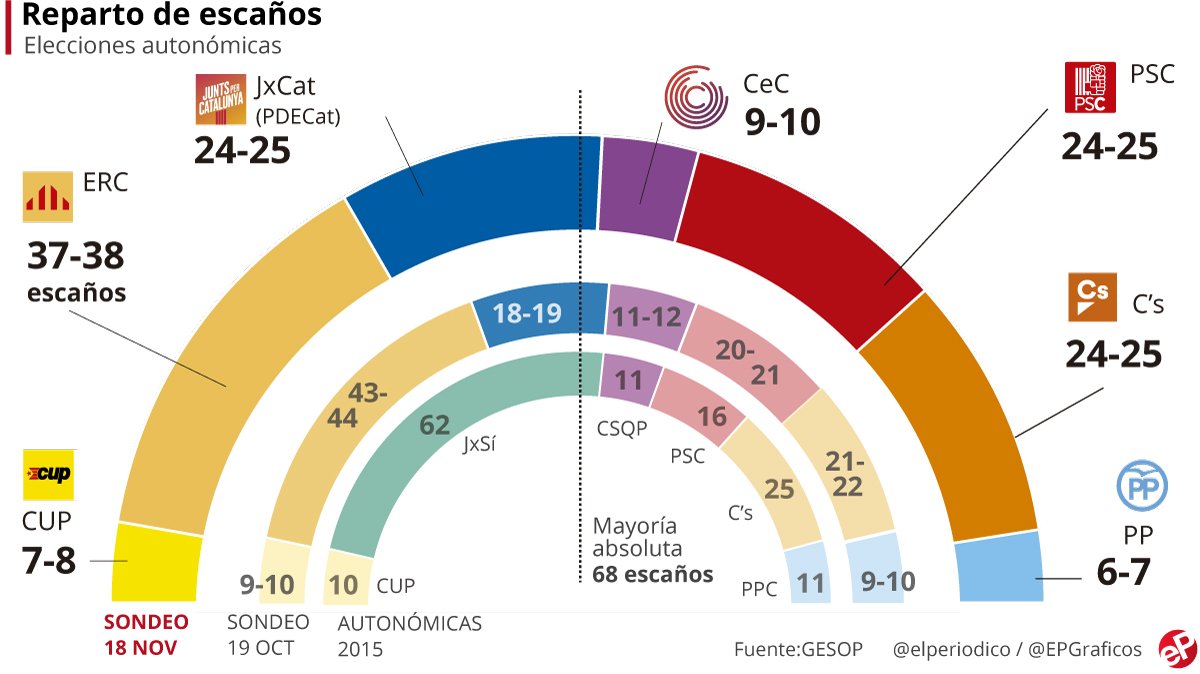
Spain (Catalonia), GESOP poll: Majority for pro-independence coalition. Election Dec 21.


- Posts : 52645
Join date : 2017-11-16
- Post n°390
 Re: Kataloniji u čast - mogući referendoom
Re: Kataloniji u čast - mogući referendoom
Jbt, kolko su podeljeni...

- Guest
- Post n°391
 Re: Kataloniji u čast - mogući referendoom
Re: Kataloniji u čast - mogući referendoom
The Roots of Spanish Rage http://jacobinmag.com/2017/11/the-roots-of-spains-rage/

- Guest
- Post n°392
 Re: Kataloniji u čast - mogući referendoom
Re: Kataloniji u čast - mogući referendoom
izbori kao ratifikacija referenduma:
Puigdemont launches Catalan election campaign from Belgium
Ousted Catalonian leader kicked off his campaign from the outskirts of Bruges and called on voters to back independence.
By SARA STEFANINI 11/25/17, 5:06 PM CET
Catalonia’s former leader Carles Puigdemont kicked off his campaign for regional elections from Belgium on Saturday, saying voters must “ratify” their call for independence from Spain.
The Catalan region is holding parliamentary elections on December 21, after Spanish Prime Minister Mariano Rajoy last month dissolved the Catalan parliament and fired Puigdemont for his role in the independence referendum outlawed by Madrid. Puigdemont then fled to Belgium with four of his ministers and faces charges of rebellion and sedition.
“We Catalans demonstrated to the world that we have the capacity and the will to become an independent state. And on [December 21], we must ratify this,” Puidgemont said Saturday, launching his campaign from a hotel in Oostkamp, outside Bruges, according to Belgian daily Le Soir.
Puigdemont is running as the head of the All for Catalonia political group, which includes members from his conservative, separatist Catalan European Democratic Party and civil society, Agence France-Presse reported.
Rival Republican Left of Catalonia, led by Puigdemont’s former vice president Oriol Junqueras who is currently in custody in Spain, is leading in the polls.
Puigdemont criticized the lack of unity among separatist parties ahead of the December vote. “It’s Catalonia’s moment, not the moment of political parties,” he said, adding that the election will be “the most important in our history.”
Puigdemont and the four former ministers are waiting for a Belgian court to decide whether to extradite them in response to a European arrest warrant issued by Madrid. The court’s decision is due by December 4.

- Guest
- Post n°393
 Re: Kataloniji u čast - mogući referendoom
Re: Kataloniji u čast - mogući referendoom
Spain's supreme court has withdrawn an international arrest warrant for Catalonia's former leader Carles Puigdemont and four other members of his deposed cabinet.
...
On Tuesday a Spanish judge however said that individual EAWs were not valid for crimes allegedly committed by a wider group of people – in this case the whole Catalan government.
He added that the five politicians had in any case shown their "intention to return to Spain" to run in elections in Catalonia.

- Guest
- Post n°394
 Re: Kataloniji u čast - mogući referendoom
Re: Kataloniji u čast - mogući referendoom
45.000 ljudi podržalo Kataloniju pred zgradom EU u Briselu
Brisel -- U znak podrške nezavisnosti španskog regiona Katalonije danas se 45.000 ljudi okupilo kod zgrada EU u Briselu.
To je saopštila policija, dok su organizatori - dva udružena koja se zalažu za nezavisnost Katalonije, saopštili u sredu da očekuju 20.000 ljudi.
U Kataloniji će 21. decembra biti vanredni izbori koje je španska vlada sazvala pošto je uvela direktnu upravu u tom regionu posle smenjivanja njegovog rukovodstva zbog pokušaja otcepljenja.

- Guest
- Post n°397
 Re: Kataloniji u čast - mogući referendoom
Re: Kataloniji u čast - mogući referendoom
“We have put an end to the part of the democratic process of these more symbolic declarations,” says Marta Rovira, general secretary of the pro-independence centre-left ERC party, from her office in Barcelona.
Instead, she said they would work on “dialogue” with Madrid and the international community over independence as well as focus on “building a republic”. Ms Rovira says that means domestic political measures to build a fairer and better Catalan society.
Ms Rovira is not giving up on achieving independence, which is ultimately the “only solution” for the region. But the tactic for now will be pushing for — rather than attempting to seize — independence from Spain.
Unlike the previous Catalan government, she set no deadline for achieving independence.
Instead, she said they would work on “dialogue” with Madrid and the international community over independence as well as focus on “building a republic”. Ms Rovira says that means domestic political measures to build a fairer and better Catalan society.
Ms Rovira is not giving up on achieving independence, which is ultimately the “only solution” for the region. But the tactic for now will be pushing for — rather than attempting to seize — independence from Spain.
Unlike the previous Catalan government, she set no deadline for achieving independence.

- Guest
- Post n°398
 Re: Kataloniji u čast - mogući referendoom
Re: Kataloniji u čast - mogući referendoom
Scuffles break out as artworks removed from Catalan city's museum
Police clash with protesters in Lleida as 44 works of art at centre of dispute between Catalonia and region of Aragón are removed
Catalan Mossos d’Esquadra officers scuffle with demonstrators as they cordon off the area around Lleida museum. Photograph: Manu Fernandez/AP
Sam Jones in Madrid
@swajones
Monday 11 December 2017 14.39 GMTFirst published on Monday 11 December 2017 12.16 GMT
Scuffles broke out between police and demonstrators after hundreds of people gathered outside a museum in the Catalan city of Lleida to protest against the removal of 44 works of art that have been at the centre of a long-running dispute between Catalonia and the neighbouring region of Aragón.
The pieces, which include paintings, alabaster reliefs and polychromatic wooden coffins, were sold to the Catalan government by the nuns of the Sijena convent, in Aragón, in the 1980s.
The Aragonese authorities have been trying to recover the works through the courts, arguing they were unlawfully sold.
At the end of November, Spain’s culture minister, Íñigo Méndez de Vigo, received a judicial order for the return of the works.
With Catalonia currently under the control of the Spanish government after Madrid sacked the regional government over its unilateral declaration of independence, Méndez de Vigo authorised their return on behalf of the administration. The move has exacerbated tensions in Catalonia, which were already running high in the buildup to next week’s snap regional election.
In the early hours of Monday morning, experts accompanied by officers from the Guardia Civil and the Catalan police force, the Mossos d’Esquadra, entered the Museum of Lleida to begin packing up the pieces.
Around 500 people congregated outside the museum to demonstrate against the removal, some chanting “Hands up! This is a robbery!” and expressing anger over the Spanish government’s decision to assume control of Catalonia using article 155 of the constitution. Scuffles broke out between police and some protesters and a cordon was set up to allow the artworks to be loaded on to a lorry.
The mayor of Lleida, Ángel Ros, had argued that article 155 could not be applied to “sacred art” and called for common sense and wisdom to prevail.
“There is still a long way to go to resolve the litigation over these goods,” he wrote in a local paper on Sunday. “We will use all legal means to show that the purchase, by the [Catalan government] was made in accordance with the law and that the works were transferred to the Museum of Lleida with full legality and legitimacy.”
The former Catalan president Carles Puigdemont, who fled to Belgium after he was sacked, attacked the move on Twitter.
He accused the Spanish government of using the cover of night and the Guardia Civil to “take advantage of a coup d’état to plunder Catalonia with absolute impunity”.
A poll published on Sunday in the Catalan daily La Vanguardia suggests Catalan separatist parties will narrowly fall short of a majority in the election on 21 December.
The survey said Puigdemont’s Junts per Catalunya party, the Catalan Republican Left party and the anti-capitalist Popular Unity Candidacy (CUP) would win 66 or 67 seats in the 135-seat regional parliament, one or two shy of the 68 needed for a majority.

- Posts : 52645
Join date : 2017-11-16
- Post n°400
 Re: Kataloniji u čast - mogući referendoom
Re: Kataloniji u čast - mogući referendoom
sad kad se zavrsi 68-67



 by Nino Quincampoix Thu Nov 09, 2017 1:18 pm
by Nino Quincampoix Thu Nov 09, 2017 1:18 pm
 паће
паће